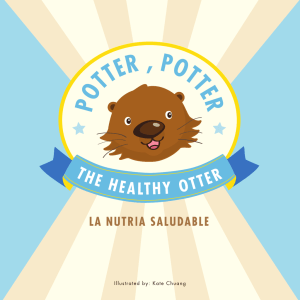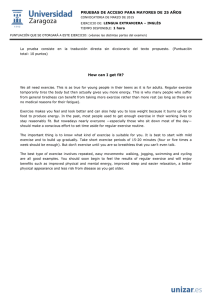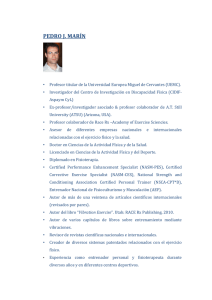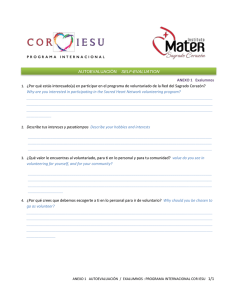POTTER THE OTTER LA NUTRIA POTTER
Anuncio
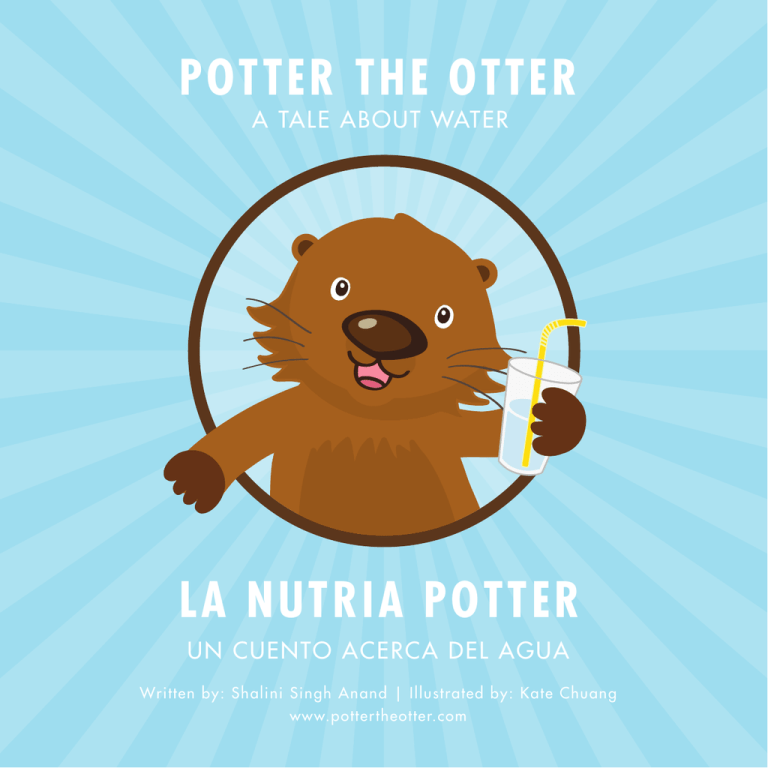
POTTER THE OTTER A TALE ABOUT WATER LA NUTRIA POTTER UN CUENTO ACERCA DEL AGUA Written by: Shalini Singh Anand | Illustrated by: Kate Chuang www.potter theotter.com How to Use This Book Read the book out loud with your children/students and point out: Show Me the Sugar Activity! The poor choice of drink on each page and why water is a better choice Line up drinks on a table: Juice Pouch, 100% Juice Box, Orange drinks, 12 oz. can of Soda, Water. Water is fuel for a child’s body Figure out how many teaspoons of sugar are in a drink: Look at the number of grams of sugar and divide by 4. Example: 20 grams of sugar = 5 teaspoons of sugar. Water is the best thirst quencher after play or anytime Be A Role Model By: Ask a child to help you count out the amount of teaspoons of sugar in each drink. (using sugar cubes or by pouring teaspoons of sugar into a clear cup). Drinking water Place the sugar next to the drink. Participating in exercise/physical education time Serving water and low-fat milk at meal and snack time Ask the kids to choose which drinks are best for their body – those would be the drinks with the least amount of sugar in them. Rewarding kids with non-food items Talk about limiting juice to no more than ½ a cup a day. Encourage kids to pledge to drink water and low-fat milk and limit their juice to no more than ½ a cup a day. Cómo Usar Est e Libr o Lea el libro con sus niños/estudiantes en voz alta y muéstreles: ¡Actividad “Muéstreme el A zúcar”! La mala opción de bebida en cada página y por qué el agua es una mejor opción Alinee las bebidas en una mesa: Bolsa de Jugo, Caja de Jugo, ‘Sunny D’, Soda de 12 onzas, Agua. El agua es el combustible para el cuerpo de un niño Descubra cuantas cucharitas de azúcar hay en una bebida: Mire al número de gramos de azúcar y divídalos por 4. Ejemplo: 20 gramos de azúcar = 5 cucharitas de azúcar. El agua es la mejor arma para la sed después de jugar o en cualquier momento Sea un Modelo a Imitar: Pídale a un niño que le ayude a contar la cantidad de cucharitas de azúcar en cada bebida (usando cubos de azúcar o echando cucharitas de azúcar en una taza clara). Tomando agua Ponga el azúcar al lado de la bebida. Participando en tiempo de ejercicios/ educación física Pídale a los niños que escojan qué bebidas son las mejores para su cuerpo – esas serían las bebidas con la menor cantidad de azúcar en ellas. Sirviendo agua y leche descremada durante el tiempo de comida y meriendas Recompensando a los niños con artículos no alimenticios Platique sobre limitar el jugo a no más de ½ taza por día. Anime a los niños a prometer beber agua y leche descremada y a limitar el jugo a no más de ½ taza por día. R PO TE THE , P O R E T T T R E T H E A LT H Y O T www.pottertheotter.com Once upon a time there was a little otter, Who loved being healthy and his name was Potter. Potter the Otter cared and he knew That exercise was healthy to do. 02 03 Érase una vez había una pequeña nutria, A quién le encantaba sentirse saludable Y su nombre era Potter. A la Nutria Potter le impor taba y sabía Que el ejercicio era saludable hacerlo. Mama and Papa Otter would say, “You need exercise, ever y day!” Exercise is fun, and you should know, Exercise is healthy, and helps you grow! La Mamá y el Papá Nutria le decían, "¡Tú necesitas el ejercicio, todos los días!" 04 05 El ejercicio es divertido, y tú deberías saber, El ejercicio es saludable, ¡y te ayuda a crecer! A Potter le encanta el ejercicio y esto es verdad. Él quiere que a sus amigos les guste el ejercicio también. Potter loves exercise and this is true. He wants his friends to love exercise too. “Let’s all go to the park,” he said one day, “And exercise with friends on the way.” 06 07 "Vamos todos al parque", dijo él un día, “Y por el camino hagamos ejercicio con los amigos.” “Look, there’s Toada, laying on a leaf.” Potter said, “Get up and get on your feet.” Taking a nap is really great. Don’t sleep all day, there’s no need to wait. “Come on Toada, come to the park. And on the way, we’ll skip and hop.” "Mira, allí está Toada, recostada sobre una hoja." Potter le dijo, "Levántate y ponte de pie." 08 09 Tomar una siesta al día está muy bien. No duermas todo el día, no hay necesidad de esperar. "Vamos Toada, ven al parque. Y por el camino, brincaremos y saltaremos." Exercise is fun, And you should know, Exercise is healthy, And helps you grow! El ejercicio es divertido, Y tú deberías saber, 10 11 El ejercicio es saludable, ¡Y te ayuda a crecer! Next, they found Moose, watching TV with Goose. “Turn off that TV. Don’t just sit and stare. Let’s go move and play out in the air.” “Goose and Moose, come to the park with me, It’s much more fun than watching TV.” 12 13 Luego, se encontraron con Mus, viendo la televisión con Gus. "Apaguen esa televisión. No sólo se sienten y vean. Salgamos a movernos y a jugar afuera al aire libre.” "Vengan conmigo al parque Gus y Mus, Es mucho más divertido que sólo estar viendo la televisión." Exercise is fun, And you should know, Exercise is healthy, And helps you grow! El ejercicio es divertido, Y tú deberías saber, 14 15 El ejercicio es saludable, ¡Y te ayuda a crecer! Across the bridge were three skunks in a bunch, Playing computer games and eating lunch. Al otro lado del puente había un grupo de tres zorrillos, Jugando juegos de computadoras y comiendo su almuerzo. Computer games can be fun and that is not wrong, But our muscles need exercise to be strong. Los juegos de computadora son divertidos y eso no está mal, Pero nuestros músculos necesitan ejercicio para estar fuertes. “Grab your wheels, and we’ll have a race. Put on your helmets and let’s star t the chase.” 16 17 “Tomen sus patinetas, y tendremos una carrera. Pónganse sus cascos y empecemos la carrera”. Exercise is fun, And you should know, Exercise is healthy, And helps you grow! El ejercicio es divertido, Y tú deberías saber, 18 19 El ejercicio es saludable, ¡Y te ayuda a crecer! Dos Mamás y sus bebés canguros, Estaban hablando en sus celulares y enviando correos también. Two Mommas and their baby kangaroos, Were talking on cell phones and emailing too. Potter said, “Let’s get moving and put down those phones. Your body needs exercise to build up strong bones.” 20 21 Potter les dijo, "Empecemos a movernos, Y guarden esos teléfonos. Su cuerpo necesita el ejercicio para formar huesos fuertes". Exercise is fun, And you should know, Exercise is healthy, And helps you grow! El ejercicio es divertido, Y tú deberías saber, 22 23 El ejercicio es saludable, ¡Y te ayuda a crecer! When they got to the park and saw slides and swings, They wanted to tr y out, all of these things. Toada the toad wasn’t tired at all. Moose then shouted, “C’mon! Let’s play ball!” Cuando llegaron al parque y vieron resbaladillas y columpios, Ellos querían tratar de hacer todas estas cosas. 24 25 Toada la rana no estaba nada de cansada. Mus entonces gritó, "¡Vamos todos a jugar a la pelota!" Goose found some water and star ted to swim, While skunks in a bunch played on jungle gyms. As for the two jumping kangaroos, They played hide’n seek and took turns saying “Boo!” Gus encontró un poco de agua y empezó a nadar, Mientras el grupo de tres zorrillos jugaban en las barras. 26 27 En cuanto a la familia de los canguros saltantes, Jugaban a las escondidas y se turnaban para decir “¡Buu!” Exercise is fun, And you should know, Exercise is healthy, And helps you grow! El ejercicio es divertido, Y tú deberías saber, 28 29 El ejercicio es saludable, ¡Y te ayuda a crecer! PHYSICAL ACTIVITY FOR YOUNG CHILDREN BIRTH TO 5 YEARS LA ACTIVIDAD FÍSICA PARA LOS NIÑOS PEQUEÑOS DESDE EL NACIMIENTO HASTA LOS 5 AÑOS WHY IS PHY S I C A L A C T I V I T Y G O O D FO R M Y Y O UNG C H I L D ? HOW OFTEN SHOULD MY YOUNG C H I L D BE P H Y S I C AL LY A C T I V E ? ¿P OR QUÉ ES LA AC TI VI DAD F Í SI C A BUEN A PARA M I N I Ñ O? ¿QUÉ TAN A ME NU DO DE BE MI N I Ñ O ESTAR F ÍSICAME NTE ACTIVO? Develops movement skills and coordination necessary for healthy development. Infants (Birth-12 months): Need to move freely (out of car seats and carriers) and do activities that promote skill development every day. Desarrolla las habilidades de movimiento y la coordinación necesaria para un desarrollo saludable. Bebés (Nacimiento-12 meses): Necesitan moverse libremente (de los asientos de seguridad y las carriolas) y hacer actividades diarias que promuevan el desarrollo de habilidades. Strengthens bones and muscles, and helps maintain a healthy body weight. Improves confidence and social skills. Stimulates brain growth. Physical activity early in life increases chances that your child remains active later in life. Toddlers (12-36 months): Need at least 30 minutes of structured activity and at least 60 minutes of unstructured activity or free play every day. Preschoolers (3-5 years): Need at least 60 minutes of structured activity and at least 60 minutes of free play every day. W HAT ARE S OME EX A MP L ES O F S T RU C T U R E D AC T I V I T I E S ? Fortalece los huesos y los músculos y ayuda a mantener un peso saludable. Mejora la auto-confianza y las habilidades sociales. Estimula el desarrollo del cerebro. Aumenta las posibilidades de que su hijo se mantenga activo en el futuro. Los niños pequeños (12-36 meses): Necesitan por lo menos 30 minutos de actividad física estructurada y por lo menos 60 minutos diarios no estructurados de actividad o juego libre. Niños en edad preescolar (3-5 años): Necesitan por lo menos 60 minutos diarios de actividad física estructurada y por lo menos 60 minutos jugando libremente. ¿C UÁLES SON ALGUN OS EJ EM P LOS DE AC TI VI DADES ESTRUC TU RADAS? Infants: Toddlers: Bebés: Niños Pequeños: Talk and sing to your baby. Hold, explore and dance with your baby. Teach them how to roll or kick a ball. Háblele y cántele a su bebé. Abrace, explore y baile con su bebé. Enséñeles cómo rodar o patear una pelota. Supervised tummy time (beginning with 3-5 minutes) helps baby strengthen neck and back muscles needed for holding their head up, rolling over and sitting up unassisted. Place a blanket on the floor and lay your baby on its stomach. Hold a toy or say your baby’s name to encourage them to raise its head. Visit the park and help them climb the steps of the slide. Tiempo boca abajo supervisado (empezando por 3-5 minutos) le ayuda al bebé a fortalecer los músculos del cuello y la espalda, necesarios para sostener su cabeza, dar la vuelta y sentarse sin ayuda. Coloque una manta en el suelo y coloque al bebé sobre su estómago. Sostenga un juguete o diga su nombre para animarlo a levantar su cabeza. Visite el parque y ayudarles a subir los escalones de la resbaladilla. Over time, encourage your baby to crawl, pull up to a standing position, play peek-a-boo, and hold your baby’s hand to help them walk. Teach them how to ride a tricycle or scooter. Con el tiempo, anime a su bebé a gatear, intentar ponerse de pie, jugar peek-a-boo, y tome la mano de su bebé para ayudarle a caminar. Enséñele a andar en triciclo o motoneta. Take a walk around the neighborhood. Bounce, sway, clap, march & dance to music. Preschoolers: Play games such as Simon Says, tag or chase. Read books about people being active and have them act out the activity. Build an obstacle course with sofa cushions, chairs or a cardboard-box tunnel to crawl through. W HAT EL S E C A N I D O ? Children develop at their own rate. Let your child set the pace. Always provide a safe place to play, both indoors and outdoors. P R O M O T E H E ALT H Y H A BI T S F R O M DAY O N E . I T ’S A W O N D E R F U L WAY T O S P E N D T I M E WI T H Y O U R N E W BA BY! Eat a variety of fruits and vegetables & let www.MyPlate.gov guide your food choices. Salte, balancee, aplauda, marche, y baile al ritmo de la música. Niños en edad preescolar: Juegue juegos de adivinanzas, juegue a ‘La Traes’ o carreras. Lea libros sobre la gente que es activa y haga que imite la actividad. Construya una ruta de obstáculos con los cojines del sofá, sillas o un túnel de cajas de cartón para atravesarlo. ¿QUÉ M ÁS P UEDO H AC ER? Los niños se desarrollan a su propio ritmo. Deje que su hijo marque el suyo. Proporcione siempre un lugar seguro para jugar, tanto en los interiores como al aire libre. Offer age appropriate toys. Ofrezca juguetes apropiados a su edad. Stop the activity if your child is crying or feeling discomfort. Detenga la actividad si su hijo está llorando o se siente incómodo. Re f e r en c e : AAHPE RD, A ct i v e St ar t : A St a t e m e n t o f Ph y si ca l A c ti v i ty G u i d e l i n e s f o r C h i l d r e n f r o m B i r th to A g e 5 , 2 n d Ed i ti o n Tome un paseo alrededor del vecindario. P ROM UEVA H Á BITOS SALU DABLE S DESDE EL P RI M E R DÍA. ¡E S U NA M ARAVI LLOSA MANE RA DE PASAR TI EM P O C ON SU BE BÉ RE CIÉ N N AC I DO! Coma una variedad de frutas y verduras y deje que www.MyPlate.gov guie sus opciones alimenticias. Ref erenc ia: A A H PER D, A c t iv e S t art : una dec larac ió n de Guías para la A c t iv idad F ísic a para lo s Ni ñ os Re ci é n Naci dos h asta l os 5 Añ os de Edad, 2ª Edic ió n Copyright © 2011 FIRST 5 Santa Clara County Art Direction: Daniel Tran Written by: FIRST 5 Santa Clara County Illustration: Kate Chuang Spanish Translation: Evelyn Lissete O'Marah Published in 2013 ISBN 978-0-615-82050-7 All rights reserved. No part of this publication may be reproduced, distributed, or transmitted in any form or by any means, including photocopying, recording, or other electronic or mechanical methods, without the prior written permission of the publisher, except in the case of brief quotations embodied in critical reviews and certain other non-commercial uses permitted by copyright law. For permission requests, write FIRST 5 Santa Clara County addressed “Attention: Potter Order Coordinator” at the address below. FIRST 5 Santa Clara County 4000 Moorpark Avenue, Suite 200 San José, CA 95117 P: 408.260.3700, F: 408.296.5642 E: order@potterloveswater.com www.first5kids.org Ordering Information Quantity sales. Special discounts are available on quantity purchases by corporations, associations and others. For details, contact FIRST 5 Santa Clara County at the address above. $4.95 © 2011 FIRST 5 Santa Clara County. All rights reserved. Printed in the U.S.A. www.first5kids.org ISBN: 978-0-615-65629-8 rev. 1 2 / 2 0 1 4
